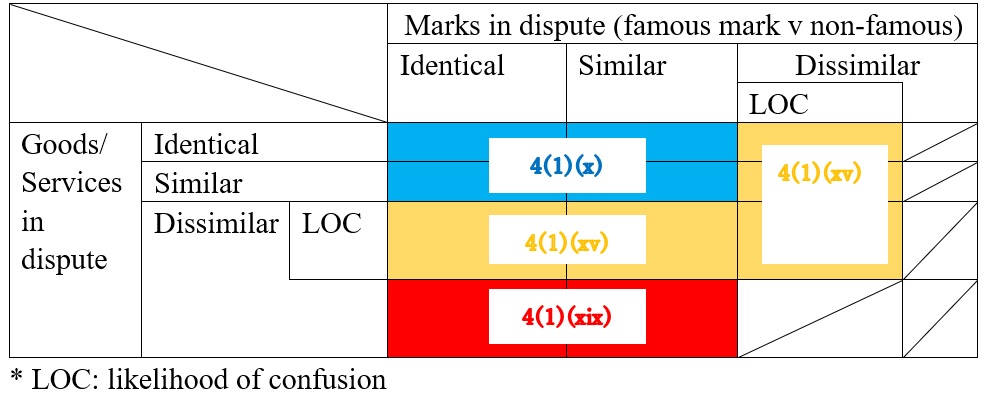Japan is a rigid “first-to-file” jurisdiction, meaning that it is necessary to register a trademark in order to obtain proprietary rights over it in principle. Prior use of the trademark is insufficient to be protected under the Trademark Law. The only meaningful exception to this rule is the treatment of so-called famous trademarks even if they have not been filed yet. But it should note owners of famous trademarks can’t file an infringement lawsuit based on the trademark right without registration in Japan. The Trademark Law provides special provisions to protect the famous trademarks. However, the statute never refers to the “famous” mark. It only refers to “recognized” marks, “widely recognized” marks, and “highly recognized” marks.
Relative grounds for refusal, opposition, invalidation
Like other jurisdictions, the Japan Trademark Law prohibits registration of junior marks which are the same as or similar to senior marks that are effectively registered in Japan under Article 4(1)(xi). In order to provide broader protection of famous trademarks, the Law stipulates extra grounds for refusal, opposition, and invalidation on Article 4(1)(x), (xv), (xix).
Article 4(1)(x)
Trademarks that are the same as or similar to trademarks that are widely recognized by consumers as marks indicating the goods or services of another and are used on the same goods or services or similar to those of the other party may not be registered.
Article 4(1)(xv)
Trademarks that are likely to cause confusion in connection with the goods or services related to another’s business may not be registered.
Article 4(1)(xix)
Trademarks which are the same as or similar to trademarks that are widely recognized among consumers either in Japan or in foreign countries as identifying the goods or services related to another’s business and are used for illicit purposes such as trading off the goodwill of another or causing damage to another may not be registered.

These articles spotlight that the Japan Trademark Law considers (1) “similarity” as a most critical issue to determine the scope of protection to famous trademark and (2) “likelihood of confusion” as other legal concepts different from “similarity”.
Defensive mark
A famous trademark may be registered as a defensive mark to cover other identified goods or services than those listed in the original registration under Article 64. These additional goods or services need to be dissimilar to the original goods or services and the registrant needs to prove (1) that the mark is “widely recognized by consumers” and (2) that confusion is likely if the mark is used on these additional goods or services by a third party.
Noteworthy is that defensive mark registration would not be vulnerable to non-use cancellation. Besides, the registrant is entitled to take action against a third party for trademark infringement even if the mark was used on the goods or services that are remotely associated with his business.
Prior use rights
As stated above, a mere prior use is insufficient to be protected under the Trademark Law. Prior user is entitled to defense for trademark infringement only where the mark is “widely recognized by consumers” as identifying the goods or services of the prior user at the filing date of initial trademark application by the registrant under Article 32.
Enforcement/Infringement
Unauthorized use of the mark that is the same as or similar to the registered mark constitutes trademark infringement under Articles 25 and 37(i).
As a matter of law, the Trademark Law does not provide broader protection of famous trademarks in enforcement. No specific provision is given to prohibit famous trademark dilution and parody. There is a considerable gray zone in the Trademark Law when it comes to the unauthorized use of “non-similar” marks that are likely to cause confusion with famous trademarks.
